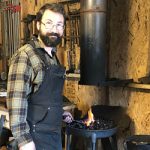 Local blacksmith Christopher Mullen finds stress relief and a creative outlet through his work with Iron Roots.
Local blacksmith Christopher Mullen finds stress relief and a creative outlet through his work with Iron Roots.
Mullen said he started forging in 2005.
“I couldn’t find a blacksmith to teach me anything, so I learned on my own and found a school for horseshoeing. It was 50 percent about making horseshoes and tools and 50 percent about horses,” he said.
Having learned from a class about horseshoeing, Mullen said that’s how his career began.
“When I first started, I was just doing horseshoeing. It was something I could do where I would set up my forge out of my truck,” he said, noting that he not only made the horseshoes, but also put them on the horses. “I did that for about four years and then joined the Army.”
Mullen served in the Army for about five years and afterward was no longer able to do horseshoeing due to injuries from serving in the military. That’s when he started doing ornamental blacksmithing.
Now, instead of working out of his truck, he is able to work from his home workshop.
“Almost all of my pieces are commissioned, with the exception of going to festivals or shows and doing demonstrations, where I’ll bring smaller pieces I’ve made,” he said.
After getting into ornamental blacksmithing, Mullen said he also began making furniture, and he does a little bit of woodworking as well.
“I enjoy the metal work better, but I do like the combination of metal and woodwork together,” he said.
Mullen explained that his work usually starts with a phone call or email from a client and then they either supply him with a picture of something they like or they make up a sketch.
Mullen said it can take up to three months to complete a piece, and added that he is usually working on roughly five pieces at a time. He noted that he also does repairs as well.
In his workshop, Mullen has two forges, one with an electric blower and one with a manual blower. For both forges, he said he likes heating the forge with coal and added that the forge can heat up to temperature in about one minute.
Mullen explained that the fire in his forge burns around 3,400 degrees and he usually gets the metal up to around 1,800 – 2,000 degrees.
“If I get it up to 2,300 – 2,400 degrees it gets to welding temperatures and if I’m not welding, I’ll burn the metal,” he said, explaining that he can tell the temperature from the color of the metal after it has been heated.
He mentioned that he mostly uses steel, but will occasionally use copper or brass.
“I mostly use mild steel, which is a low carbon steel, unless I’m making blades or knives,” he said.
Mullen said he has plans to make a forge that is more suited to his needs.
Working with metal and fire, Mullen said he has had a few injuries.
“I’ve had some minor burns and cuts and had a horse kick out my front tooth,” he said. “It’s just the hazards of the job.”
Mullen said he not only enjoys the creativity of the job, but also that it’s stress relieving.
“I enjoy the creativity of it and it’s stress relieving because of the banging and repetitive motion,” he said.
Of all the pieces he has made, Mullen said the most interesting thing he has been commissioned to make was a potato masher. Two of his favorite pieces have been an advent wreath that is hanging at St. Mary’s Episcopal Church in High Point and a piece of bamboo art, which he made out of steel with five pieces of steel bamboo coming out of a piece of wood.
Mullen noted that he belongs to the Artisan Blacksmith Association of North America and, locally, is a member of the Triad Area Blacksmiths.
“We meet twice a month at the Dixie Classic Fairgrounds,” he said.
For more information about Mullen’s work, visit his website, www.ironrootsforge.com.









